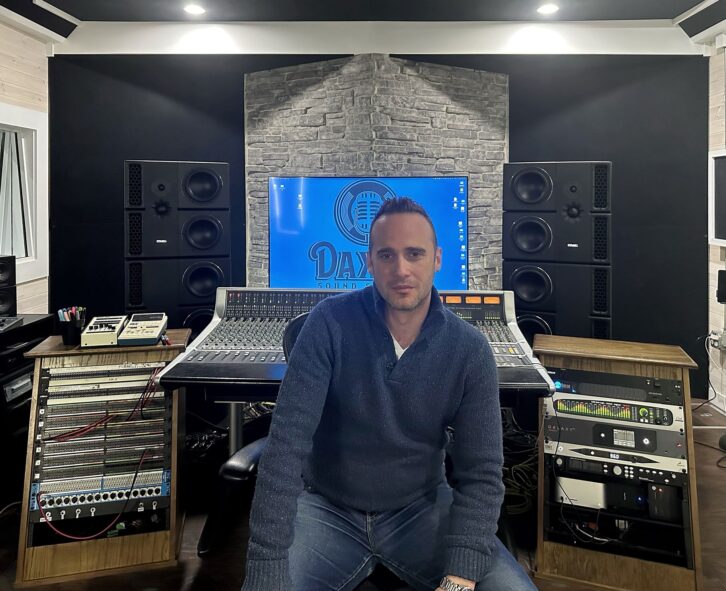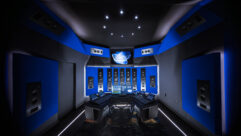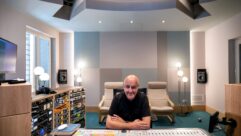
US based producer and engineer Hanan Rubinstein has recently completed the music for Paramount’s new Mean Girls movie, a musical teen comedy based on the Broadway musical of the same name.
Rubinstein’s studio, Daxxit Sound Studios, is proudly built around a pair of PMC8-2 XBD monitors that were key to ensuring pristine audio across each of the film’s 18 songs.
“These monitors are absolutely vital to my workflow because they allow me to work quickly and with total confidence,” says sound engineer and producer Hanan Rubinstein, who set up Daxxit Sound Studios in 2019 with his business partner, Ben Hyman. “We have so many projects coming through the studio that we have to be fast – but we can’t sacrifice quality. The PMC monitors take all the guesswork out of recording and mixing. With my PMC8-2 XBD, I am able to be fearless in my use of outboard processing because I know that what I commit to will always sound exactly how I heard it.”
Based in Fort Lee, New Jersey, Daxxit Sound Studios offers a range of services from ADR/Looping, recording, mixing and mastering to artist development, songwriting and production. Its clients include major and indie record labels, TV networks, streaming services, and movie studios.
A talented multi-instrumentalist, Rubinstein’s own background in the music industry encompasses a spell as a solo artist, playing guitar for Alicia Keys and working on studio and live projects with a bevy of industry leading artists including Ed Sheeran, Charlie Puth, Sara Bareilles, Bonnie Raitt, Carole King, Ellie Goulding, Lenny Kravitz, Nick Jonas, Pharrell Williams and many more.
His interest in engineering and producing developed early and after a spell at Unique recording studios in Manhattan and a number of years freelancing at other studios, he decided to set up his own room and has never looked back.
“I got a taste of many different studios and was able to find out what I liked and what I didn’t,” he says. “I love working at Daxxit so much – we are just over the George Washington Bridge (I can see the Empire State Building from my live room), but far enough to feel a little more relaxed than Manhattan recording studios. One of the main reasons I love working at Daxitt is the PMC monitors. I have used other monitors in the past, but often I would have issues with how the sound translated to other places outside of my control room. There’s no worse feeling than thinking your mix is amazing, only to hear it fall apart in your car. With PMC, that is no longer a problem. Even mastering engineers noticed a difference in my work when I upgraded. I was initially going to buy the PMC6-2s, but I went for PMC8-2 XBD because I wanted more low end so that I could satisfy certain clients who like to feel the bass in their chest. It was a leap of faith because I bought them without listening to them (which is insane, I know). I just figured that if I loved the PMC6-2s as much as I did, their big brother was bound to sound just as good, if not better. For me, it’s all about the detail. Yes, the low end thunders and there’s a lot of air moving across the spectrum, but I absolutely get the clarity I need, and that’s everything.”
Despite collaborating with many famous artists, Rubinstein says that the Mean Girls project was a highlight of his career because he was once again able to work closely with composer Jeff Richmond who wrote the music.
“Jeff and I have been friends for years,” he says. “We first worked together on the Netflix series The Unbreakable Kimmy Schmidt, and since then we have worked on many other projects. Mean Girls stemmed from that relationship. The man is absolutely brilliant and also one of the funniest people I have ever met.”
As the lead music producer, Rubinstein helped shape Richmond’s music by fortifying his compositions on a sonic level and taking more of a pop approach to the Broadway originals. All of the recording took place in Rubinstein’s studio, with the exception of strings, which were recorded at the DiMenna Center for Classical Music because a 30-piece orchestra simply wouldn’t fit into Daxxit Sound Studios.
“I handled all the recording at our place and was super honoured to have Manny Manoquin and Chris Galland help out with mixing the numbers, which freed me up to mix the score,” he explains. “Our stems were sent to Lew Goldstein at Parabolic in New York who made a few tweaks and did the theatrical Atmos mix. I used Neumann U87 mics for the recording because I didn’t want anything too esoteric in case we had to carry out any ADR. This was important because the cast had moved on to projects in many different locations – Angourie Rice, for example, who plays Cady Heron, was in Australia and there was no way she was going to fly back to do a couple of lines of ADR.”
Rubinstein adds that some bold moves were taken with the production. “At the back of my head I was constantly aware that many people love Jeff’s Broadway cast album and might chew me out for changing tempos and instruments,” he laughs. “Overall, the comments have been incredibly positive, which is gratifying. I think you have to approach projects like this with integrity and see what you can bring to the table.”
Mean Girls 2024 was released in January and by the end of the month it had already grossed over $80 million worldwide. Hanan Rubinstein has now moved on to other tasks, including a number of TV projects for Netflix and song production for various artists. ln addition, he’s building a new family home, which will have its own recording studio and live room. Needless to say, it will also have PMC monitors because, as Rubinstein says, how could it not?
-ends-
About PMC
PMC is a UK-based, world-leading manufacturer of loudspeaker systems, the tools of choice in all ultra-critical professional monitoring applications, and also for the discerning audiophile at home, where they provide a transparent window into the recording artist’s original intentions. PMC products use the best available materials and design principles, including the company’s proprietary Advanced Transmission Line (ATL™) bass-loading technology, cutting-edge amplification and advanced DSP techniques to create loudspeakers that present sound and music exactly as it was when first created, with the highest possible resolution, and without colouration or distortion. For more information on our clients and products, see www.pmc-speakers.com.










